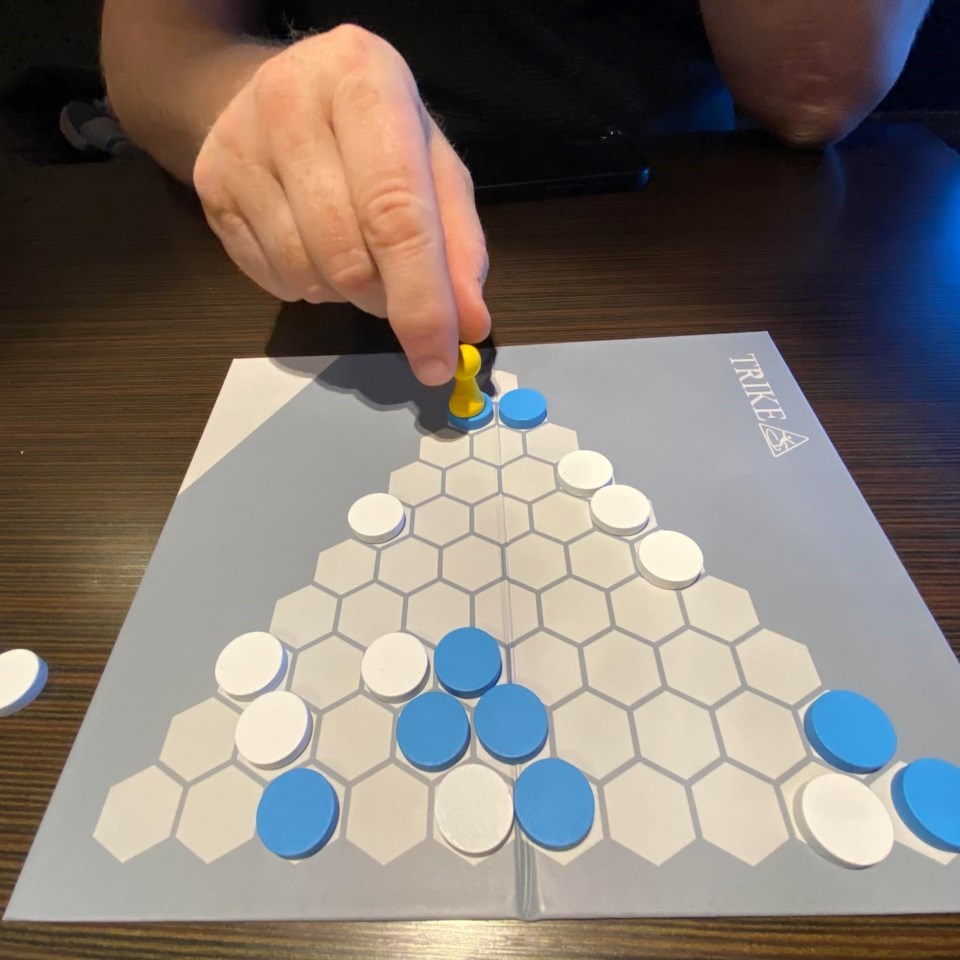YORKTON - Game rules can be deceiving.
There are times a read through of the rules raises expectations which play soon dashes, and of course the opposite is equally true.
Take for example Trike by designer Alek Erickson and recently released by Kanare Abstract.
The rule set for Trike, which are super straight forward and easily grasped, the game frankly sounded rather mundane, so the expectation for this one was not overly high.
But, once on the table the game showed more depth of play – the brain effort needed to ascertain good moves – than expected, and of course that is a very good thing.
Trike is a two-player game played on an equilateral triangular hexagon-tessellated grid.
The triangular board was actually a bit of a head scratcher to be sure. But via email Erickson said the board was actually a “eureka” moment for him because by its nature it created a situation where Trike would never end in a draw. That can be an issue for abstract strategy games played at a high level to avoid draws is another good thing.
As for easy to-learn; players take turns moving a neutral pawn around on the board (passing is not allowed). The neutral pawn can move any number of empty points, in any direction in a straight line, but cannot move onto, or jump over occupied points. When a player moves the pawn, first they place a checker of their own colour, onto the destination point. Then they move the pawn on top of it.
When the pawn is trapped, the game is over. At the end of the game, each player gets a point for each checker of their own colour adjacent to, or underneath, the pawn. The person with the highest score wins.
“If I had to put a story to it, I would say that Trike is a game in which a mortal (the pawn) is trapped in a pyramid (the board), running around the corridors, tunnels and traps, while the forces of light magic and dark magic (the players) compete to trap the soul within their sphere of influence,” offered Erickson via email.” But really it is simply an abstract strategy game with no theme, no draws, no ties, no luck, no randomness, and no hidden information. Just pure strategy and tactics, and a lot of pattern recognition.”
It’s actually brilliantly straight forward, and while perhaps not completely unique in mechanics feels very fresh.
“This game was the result of me pondering a game mechanic that I had not seen before - where the placement and movement are ‘coupled’ such that every movement ‘leaves behind’ or ‘anticipates’ a stone placement,” said Erickson.
“I was excited about this because the mechanic was original, but also elegant in the sense that it turns two decisions into one. I tried many versions of Trike, with various win conditions and goals, until I really started listening to what the game itself "wanted" to be. Thought process was like: "Of course, this pawn is moving around and will eventually get trapped. What happens then?
“Well, if the game doesn't end, then we need more rules. Hmm. Let's keep the rules to a minimum ... OK, so the game ends when the pawn is trapped. But who wins? Well, it could be the last to play? ... No, then it turns into a parity match, with the stone colours being meaningless. We want to allow players to build up an advantage by carefully positioning their stones versus the opp. OK, so maybe the player wants to surround the pawn with their pieces? But we don't want the game to be drawish ... Eureka! On a triangle shaped board, one colour will always be surrounding the pawn to a greater extent!" And Trike was born.”
The Kanare edition offers a reversible board which is great.
“The size seven board is for learning the game and should offer a nice quick tactical battle,” said Erickson “As you play Trike more, you will find yourself gravitating towards playing on larger boards such as the size 10 or even larger. I play on size 13 or 15 usually nowadays. The game really opens up with more space, and it becomes even more satisfying when it nears that tense conclusion where the outcome lies on a razor's edge. If you play cleverly, you can control the flow of play such that the game naturally ends up in your sphere of influence.”
Rightfully the game has created some buzz in the abstract strategy community with the game implemented online and supported by Erickson with the production of the free 1000 Trike puzzles book: https://boardgamegeek.com/filepage/257935
Ultimately for ‘guilder’ Trevor and myself Trike was a most pleasant surprise. Much more ‘game’ than expected, with such simplicity, (great for coffee time exploration on the smaller board), hiding a much deeper layer of strategy to be explored. Really Trike should be a ‘must-have’ for abstract strategy fans.






